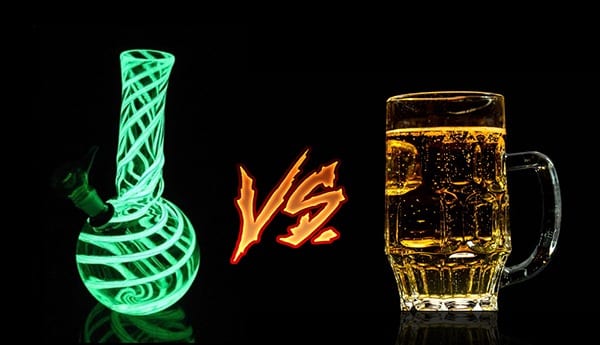Editor: Draco Copper | Tactical Investor
Millennials Prefer Pot to Beer
The preferences and habits of millennials have long been a subject of fascination and scrutiny. As this generation continues to come of age and shape cultural trends, one question has emerged prominently: “Do Millennials Prefer Pot to Beer?” In this comprehensive exploration, we delve into the evolving landscape of millennials’ choices, their relationship with marijuana and alcohol, and the broader societal implications of these preferences.
The Changing Landscape of Millennial Consumption
The millennial generation, often defined as those born between 1981 and 1996, has witnessed a significant shift in consumption patterns compared to previous generations. Traditional staples like beer, long associated with social gatherings and relaxation, are facing competition from the rising popularity of cannabis.
Over the past decade, a noticeable transformation in millennial preferences has unfolded. This shift reflects changing attitudes towards marijuana and alcohol, both of which play pivotal roles in the social fabric of this generation.
Cannabis, the Rising Star
One key factor in the changing landscape is the legalization and decriminalization of marijuana in various U.S. states and countries around the world. As marijuana becomes more accessible and socially acceptable, millennials are increasingly turning to it as a recreational option.
The proliferation of legal marijuana dispensaries and the availability of a wide range of cannabis products, from edibles to vape pens, have contributed to the surge in popularity among millennials.
A Lifestyle Choice
For many millennials, marijuana represents more than just a substance to consume; it embodies a lifestyle choice. The culture surrounding cannabis, with its emphasis on wellness, relaxation, and creativity, resonates strongly with this generation.
Millennials often cite the calming effects of cannabis as a way to unwind and alleviate stress, making it an attractive alternative to traditional forms of relaxation like alcohol.
Beer’s Battle for Relevance
The beer industry, historically dominant in the world of alcoholic beverages, is grappling with the challenge of maintaining its relevance among millennials. Craft breweries have attempted to cater to changing tastes, offering a wider variety of flavors and experiences.
Despite these efforts, beer consumption among millennials has declined, as they seek more diverse options that align with their values and preferences.
Health and Wellness Considerations
Health consciousness is another driving force behind millennials’ changing consumption habits. Many are opting for products perceived as healthier alternatives to alcohol. Cannabis, particularly in its non-smoking forms, is often seen as a safer choice with potential therapeutic benefits.
The desire for products that promote relaxation without the negative health consequences associated with excessive alcohol consumption has led millennials to explore cannabis as a viable option.
Social and Cultural Factors
Millennials are often characterized as socially conscious and environmentally aware. Cannabis, which has made strides in sustainability practices and ethical production, aligns more closely with these values than mass-produced alcoholic beverages.
The eco-friendly cultivation practices of some cannabis producers and the rejection of excessive packaging contribute to marijuana’s appeal for millennials who prioritize sustainability.
The Intersection of Cannabis and Craft Beverages
Interestingly, some entrepreneurs are bridging the gap between marijuana and alcohol by developing cannabis-infused beverages. These products aim to provide a novel experience that combines elements of both worlds.
The emergence of cannabis-infused beverages represents an innovative response to millennials’ evolving preferences, offering a unique blend of relaxation and social interaction.
Regulatory and Legal Challenges
Despite the increasing acceptance of cannabis, it faces ongoing regulatory challenges that vary by jurisdiction. These legal complexities can affect millennials’ access to and choices regarding cannabis and alcohol.
The patchwork of marijuana laws across states and countries can create confusion for consumers, impacting their ability to make informed choices.
Implications for the Alcohol Industry
The decline in beer consumption and the rise of marijuana use among millennials have implications for the alcohol industry. Breweries and distilleries are forced to adapt to changing market dynamics.
To remain competitive, alcohol producers are exploring innovative products and marketing strategies that resonate with millennials’ preferences.
The Broader Societal Impact
The evolving preferences of millennials regarding marijuana and alcohol extend beyond individual choices; they have wider societal implications. These trends can influence public policy, healthcare, and cultural norms.
As millennials continue to shape consumption patterns, policymakers and industries must navigate the impact on taxation, public health, and social interactions.
The Future of Millennial Preferences
The question of whether millennials prefer pot to beer may evolve further in the coming years. Generation Z, the cohort following millennials, may introduce new dynamics and preferences, reshaping the landscape once again.
Understanding the evolving preferences of millennials is crucial for businesses, policymakers, and industries seeking to adapt to changing consumer behaviors.
Conclusion
The preferences of millennials, including their choices between marijuana and beer, reflect a broader cultural shift in consumption patterns. As this generation continues to redefine societal norms, it is clear that marijuana’s rising popularity is not just a passing trend but a reflection of evolving values and lifestyle choices.
The interplay between cannabis and alcohol, along with the regulatory challenges and societal implications, paints a complex picture of changing preferences among millennials. Businesses and policymakers must stay attuned to these shifts to navigate the evolving landscape successfully.











